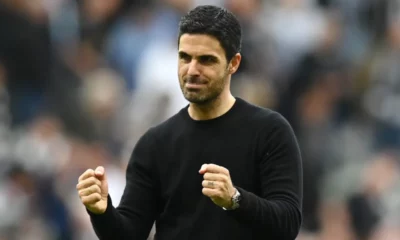Arsenal
Fallen Idol?
By Guest Writer Chris Palmer.
The 32 nations who will compete for the 2010 World Cup in South Africa this summer have now begun their preparations as we excitedly countdown to the first match on the 11th June between hosts South Africa and Mexico.
Amongst those who will compete are a list of familiar names; the mighty Brazil, five times champions and the only country to have qualified for every World Cup since it began in 1932, the painfully consistent Germans, thrice winners and runners-up on a further four occasions, the Azzurri of Italy, the current holders whose defensive tenacity always makes them difficult to beat. Here, we’ll all be hoping that England can finally end 44 years of misery and bring football “home”. France and Holland are always a threat and the Ivory Coast look like they have the best chance at becoming Africa’s first World Cup winners. But for this article I’d like to focus on Argentina and their national hero come national manager Diego Armando Maradona.
Argentina, along with neighbours and rivals Brazil, are one of the perennial superpowers of football in South America and also on the world stage. Qualification for the World Cup is seen as the lowest imaginable expectation amongst a nation of football fanatics who are fiercely proud of their national team. However this was almost not achieved by the Albicelestes (the Light blue and whites) as they endured a qualifying campaign rife with difficulties. Under the management of Alfredo Basile Argentina recorded just one win in their opening seven games. Facing the prospect of what would be perceived as a national disaster in not making the 2010 World Cup Finals the Argentinean Football Association sacked Basile and called out to a national hero, Diego Maradona, to save them. As a player Maradona dragged Argentina almost single-handedly to World Cup success in 1986 and in doing so lifted himself to the status of national icon in his homeland. When it comes to talking of the greatest players of all-time invariably it comes down to just two players; Maradona or Pele. But for all the illustrious success of his playing career Maradona had very little experience in management, a meagre 23 games of which he had won a mere 3.
Despite his relative lack of managerial experience “El Diego” rescued Argentina’s campaign leading them to fourth place and the final automatic qualification place in South America, albeit by the skin of their teeth. But Maradona is quickly learning that he is not being held in quite the same reverence as a manager as he was as a player. His tenure as manager has been heavily criticised particularly in Argentina, he has been seen as rash in his tactical decisions and substitutions. Argentina suffered a humiliating 6-1 defeat to Bolivia in qualifying, equalling the record for their worst defeat, and his reputation as being “hot-headed” has only been further accentuated by a foul mouthed outburst at the press after ensuring qualification for which he was subsequently handed a two month ban by FIFA, rather lenient given that Argentina would only play two meaningless friendlies during this period one of which was subsequently cancelled. As a player this rawness of emotion was perhaps what raised him above those around him but as a manager it is being perceived as a potential weakness.
It is quite common in football that the best players don’t always make the best managers and quite often it is the “lesser” players not blessed with an abundance of natural talent that make the better managers, think of Arsene Wenger, Jose Mourinho and even Sir Alex Ferguson. This is perhaps due to the fact that they are more likely to work harder at the fundamentals of the game such as tactical and positional sense along with teamwork. These are elements of the game that become so integral in management. As a player this may perhaps seems a chore as they look on at their more “gifted” counterparts but when it comes to management it gives them a better understanding of football as a whole. It also makes it easier for them to relate to and understand the players they are now in charge of. How does Diego Maradona, a man blessed by such talent as a player, relate and understand the players he is now coaching especially those who possess only a fraction of the talent he himself possessed?
In recent games Maradona has been showing a more pragmatic tactical approach to games by solidifying his defence by deploying four centre-backs, two playing as centre backs and the other two playing in the full-back positions, and hitting opposing teams on the counter-attack. However with talents such as Lionel Messi and his own son-in-law Sergio Aguero at his disposal Maradona perhaps runs the risk of being called too negative and not playing football in the “traditional” Argentinean\South American way, a criticism so often levelled at his Brazilian rival Dunga. “El Diego” has already courted the wrath of Argentinean fans with Juan Roman Riquelme, a particular favourite, retiring from international duty due to a “disagreement” with Maradona.
The status to which he is held in Argentina thanks to his exploits as a player means that taking over as the manager of the national team could only ever harm his reputation in his homeland and Maradona must surely be commended for his bravery and devotion to his country in choosing to risk this. If there is one thing that nobody can doubt it is Maradona’s dedication and passion for his country, particularly on evidence during their games in the last World Cup in Germany where he could often been seen screaming and dancing in the stands. It will take some amazing feats as a manager to reach the dizzying heights that he reached as a player but he has ensured that Argentina will be at the 2010 World Cup and given the situation they were in before he took over this represents a substantial achievement. Perhaps this national icon is the man to lead them to World Cup success in South Africa but then will even this be enough to keep him in the “God-like” status to which he has grown accustomed in Argentina?


















